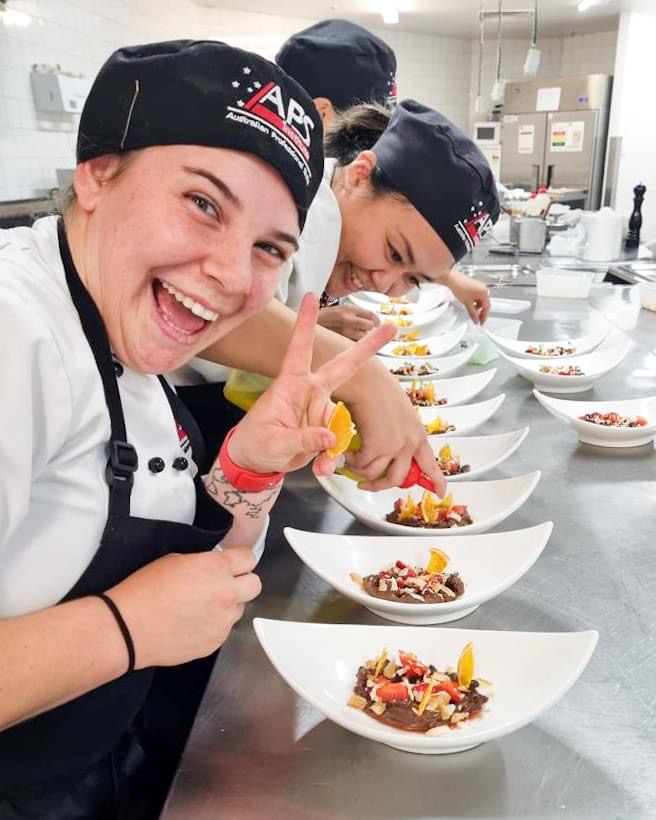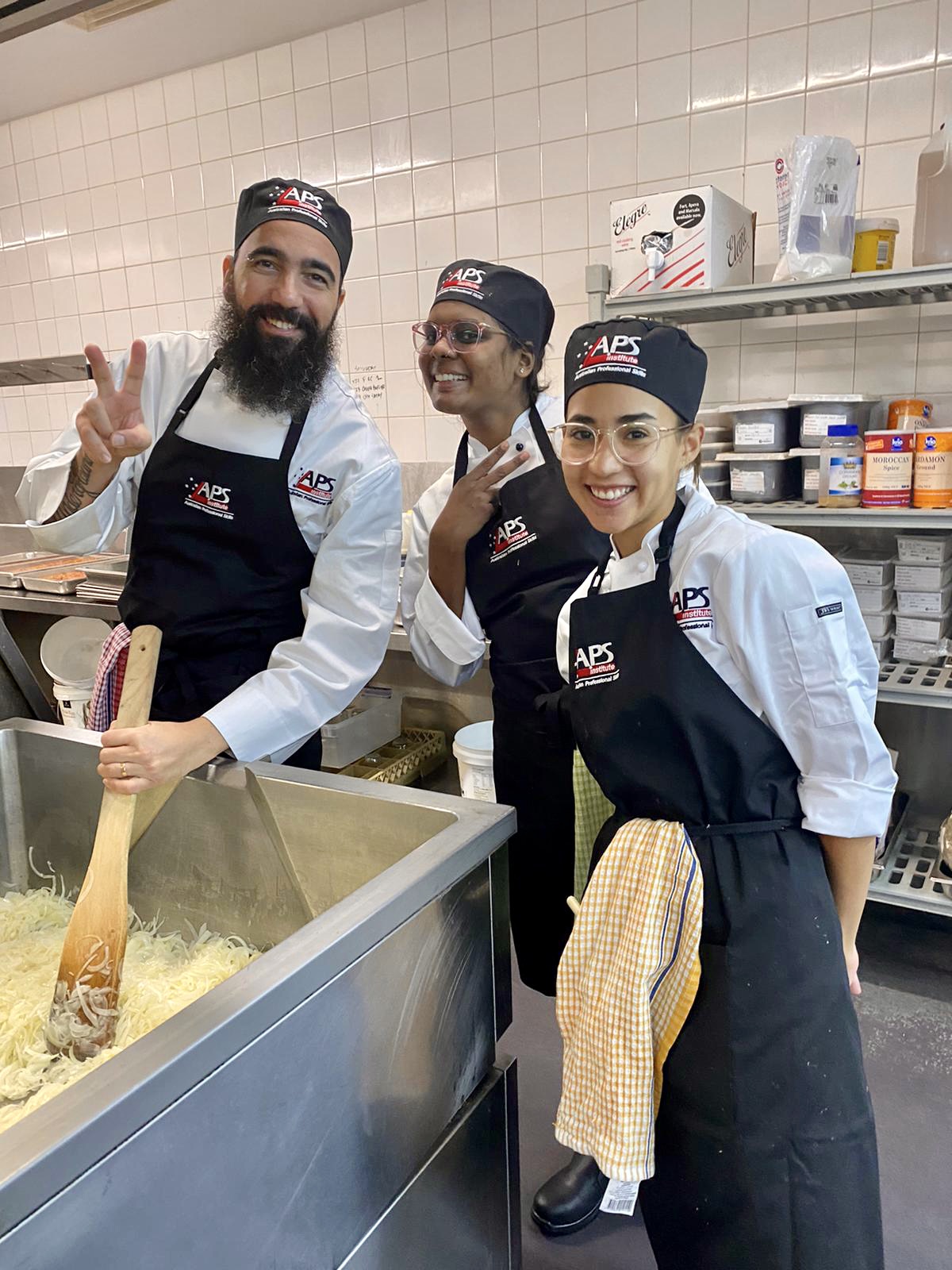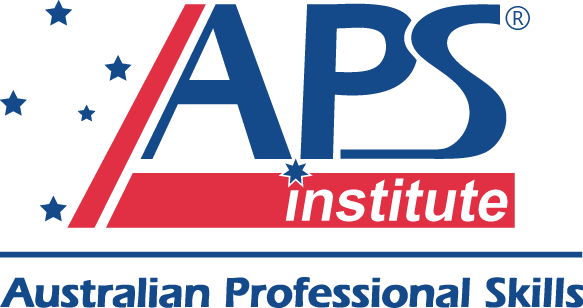
Diploma of Hospitality Management
|
|
CRICOS Course Code: 111112BVET National Code: SIT50422 |
IMPORTANT NOTE: This course is not suitable for persons unable to handle meat, seafood, poultry or dairy. We cannot guarantee that our kitchen facilities are free from potential allergens, including airborne particles of potential allergens. Accordingly, this course may not be suitable for people with severe allergies, including nuts allergies. Please note that all students must complete the units of competency required.
Course Description
This Diploma of Hospitality Management qualification is suitable for students who have completed Certificate III and IV in Commercial Cookery and want to advance their knowledge and skills in hospitality operations. Students will learn to operate independently, have responsibility for others and make a range of operational business decisions.
Career outcomes:
This qualification provides a pathway for students to work in a team leader role in hospitality industry. Possible job titles include:
- Chef de cuisine
- Kitchen manager
- Restaurant manager / owner
- Sous chef
- Unit manager (catering operations)
Course Admission Requirements
Australian Professional Skills Institute is CRICOS registered (CRICOS Provider Code 03255G). All students must be over 18 years of age before they can commence this course at APSI.
Domestic Australian Students
- Student must complete Certificate III and Certificate IV in Commercial Cookery.
- For direct entry into Diploma/Advanced Diploma level courses, students must have completed a minimum of Year 12 schooling or equivalent or to be a mature age student (20 years of age and above) with relevant work experience.
- Students who have not completed Year 12 are permitted to study a certificate level course at APSI prior to the diploma.
- Students need to demonstrate they have proficiency in English. If students cannot provide documented proof of their English language proficiency, they will be required to sit for a Language, Literacy and Numeracy test (LLN) before a place can be offered.
International Students
- Student must complete Certificate III and Certificate IV in Commercial Cookery.
- Students need to demonstrate they have proficiency in English. For international students and English language requirements, please view the page for entry requirements here.
- For direct entry into Diploma/Advanced Diploma level courses, students must have completed a minimum of Year 12 schooling or equivalent or to be a mature age student (20 years of age and above) with relevant work experience.
- Students who have not completed Year 12 are permitted to study a certificate level course at APSI prior to the diploma.

Juan Galeano Astaiza’s story (from Colombia)
Unit Code |
Unit Name |
Core Units |
|
|
SITXCCS015 |
Enhance customer service experiences |
|
SITXCCS016 |
Develop and manage quality customer service practices |
|
SITXCOM010 |
Manage conflict |
|
SITXFIN009 |
Manage finances within a budget |
|
SITXFIN010 |
Prepare and monitor budgets |
|
SITXGLC002 |
Identify and manage legal risks and comply with law |
|
SITXHRM008 |
Roster staff |
|
SITXHRM009 |
Lead and manage people |
|
SITXMGT004 |
Monitor work operations |
|
SITXMGT005 |
Establish and conduct business relationships |
|
SITXWHS007 |
Implement and monitor work health and safety practices |
Elective Units |
|
|
SITXFSA005 |
Use hygienic practices for food safety |
|
SITHCCC043 |
Work effectively as a cook |
|
SITHCCC023 |
Use food preparation equipment |
|
SITHCCC025 |
Prepare and present sandwiches |
|
SITHCCC027 |
Prepare dishes using basic methods of cookery |
|
SITHCCC028 |
Prepare appetisers and salads |
|
SITHCCC029 |
Prepare stocks, sauces and soups |
|
SITHCCC030 |
Prepare vegetable, fruit, eggs and farinaceous dishes |
|
SITHCCC031 |
Prepare vegetarian and vegan dishes |
|
SITHCCC035 |
Prepare poultry dishes |
|
SITHCCC036 |
Prepare meat dishes |
|
SITHCCC037 |
Prepare seafood dishes |
|
SITHCCC038 |
Produce and serve food for buffets |
|
SITHCCC042 |
Prepare food to meet special dietary requirements |
|
SITHCCC044* |
Prepare specialised food items |
|
SITXFSA006 |
Participate in safe food handling practices |
|
HLTAID011 |
Provide First Aid |


Mode of Delivery
Each day of delivery follows the same structure. The first 2 hours involves trainer lead but student focussed explanation, demonstrations, presentations, questions and answers, student practice. The second 2 hours involves the trainer and student undertaking their assessment tasks on premises (as a learning tool) utilising the specialised training facilities under the required supervision of the trainer.
Students need to attend classes at APSI for a minimum of 20 contact hours per week. Students will be given a timetable during orientation. Class hours will be scheduled between 9:00am to 5:00pm (Monday to Friday).
Career Outcome
- chef de cuisine
- kitchen manager
- restaurant manager
- sous chef
- unit manager (catering operations)
Course Duration
Diploma of Hospitality Management Management (Commercial Cookery specialisation)- 26 Weeks for Diploma core units
Students are expected to have completed the units in Certificate IV in Commercial Cookery and all units from Certificate IV level will be credit transfer to this qualification.
Students transferring from other institutions must complete the application for credit transfer form at the time of enrolment and attach all supporting evidence including a full academic transcript or statement of attainment issued by another RTO. APSI reserves the right to make the final decision on the number of units for credit transfer and the total duration of this course after the credit transfer application is processed. Please allow at least 10 working days for credit transfer application.
Entry Requirements
- Minimum 18 years of age
- Completion of Year 11 or high school or equivalent
- Have a passion to work in hospitality industry
- For international students and English language requirements, please view the page for entry requirements here.
- Must complete Certificate III and Certificate IV in Commercial Cookery
Timetable
Students need to attend face to face training at APSI campus and other training locations for a minimum of 20 hours per week.
Class hours (Practical Classes): Monday to Friday - between 7 am to 8 pm.
Class hours (Theory Classes): Monday to Friday - between 8:30 am to 5 pm.
Timetables/Delivery Schedules/Classes are subject to change without prior notice due to availability of training kitchens and teaching staff. Students will be given a timetable during orientation.
Assessment Methods
Assessment is based on the principles of competency based training. Performance of learners is assessed on their ability to perform the task(s) to industry standards. In order to ensure the principles of validity are upheld are variety of learning styles and a range of assessment strategies are used.
Assessment for each unit of competence will be through a combination of classroom based and work placement tasks. Classroom based assessment includes but is not limited to:
- Classroom exercises
- Assignments
- Practical demonstrations
- Group Activities
- Projects
- Verbal and/or written questions
Students are advised well in advance of assessment activities and a student may put forward for consideration any special needs they may have. The assessment criterion is documented in all modules, and workbooks. Dates of assessment are provided on the first day of class along with a timetable. Students may be assessed by a combination of continuous assessment and examinations. Continuous assessment may be based on competencies and marks, or a combination of both.
Uniform
Dress code while attending theory class at APSI campus
There is a dress code for all hospitality students. Students are required to wear a white shirt / blouse and black trousers or skirt while attending class. Flat black non-slip covered shoes must be worn at all times.
All learners are required to wear in accordance with Cookery Students Dress Code while attending workplace training.
Recognition of Prior Learning
Recognition of Prior Learning (RPL)
RPL is available to anyone who has experience working in a commercial kitchen.
RPL:
- provides an alternative pathway to achieving a qualification without course attendance
- is a consultative process between with the candidate and the assessor to determine whether the candidate has acquired the requisite learning, skills and knowledge to demonstrate that they have achieved the required learning outcomes or performance criteria of the course or qualification, for which the candidate is seeking
- identifies where appropriate additional learning experiences or training gaps are needed to achieve the course or qualification
- is the conduct of an assessment to confirm competency.
APSI has developed a process that promotes holistic and task-based assessment. It focuses on relating assessment activities to actual job tasks. The intention of this model is to streamline and simplify the process of recognising competency.
Prior to RPL, information is provided to the candidate on the assessment process. Specific advice is given to each candidate on how they can demonstrate their competence and what documentary evidence is required to support their application. Each industry has unique documents that can provide evidence of experience and competence.
The candidate is required to provide adequate information prior to, throughout and after a training and assessment experience. The assessor, in this process, needs to be fully aware of the needs of the candidate and help them identify relevant workplace personnel who can confirm the candidate’s competency.
The focus of the APSI streamlined holistic assessment process is to focus on demonstrated skills and knowledge and not to rely purely on documentary evidence as the main source of evidence.
Some examples of documentary evidence that can support the process include:
- licences such as First Aid, RSA
- CV or work history with details of job role and responsibilities
- previous qualifications from overseas and Australia
- certificates and records of results or assessments completed with other RTO’s
- photographs of work undertaken
- samples of related project work
- diaries of tasks performed
- task sheets/job sheets/logbooks
- site training records
- pay slips / employment contracts / job descriptions
- memberships of relevant professional associations
- references/letters/third party reports from previous employers/supervisors
- industry awards
- performance appraisals
Accreditation
Articulation
Bachelor of Commerce (Year 2 with 120 credit points)
Bachelor of Hospitality and Tourism Management (Year 2 with 120 credit points)
Bachelor of International Hotel and Resort Management (Year 2 with 120 credit points)
Employment Skills
(Source: AQF Implementation Handbook 2007)
Location of Delivery
East Perth main campus
Wellington Fair, 40 Lord Street, East Perth, WA 6004 Western Australia
Practical kitchens and industry work placement
Rendezvous Hotel Perth Scarborough
Address: 148 The Esplanade, Scarborough, WA 6019
Rendezvous Hotel Perth Central
Address: 24 Mount Street, Perth WA 6000
Website| rendezvoushotels.com
Industry Workplace Training
At the Workplace approved by your course coordinator
Disclaimer
The information contained on this website is current at the time of publishing. Australian Professional Skills Institute reserves the right to change the admission requirements, fees, location of delivery and units of competency whenever necessary. Please contact us for the most current information.


